BusinessEurope Headlines No. 2018-25
European unity is needed more than ever
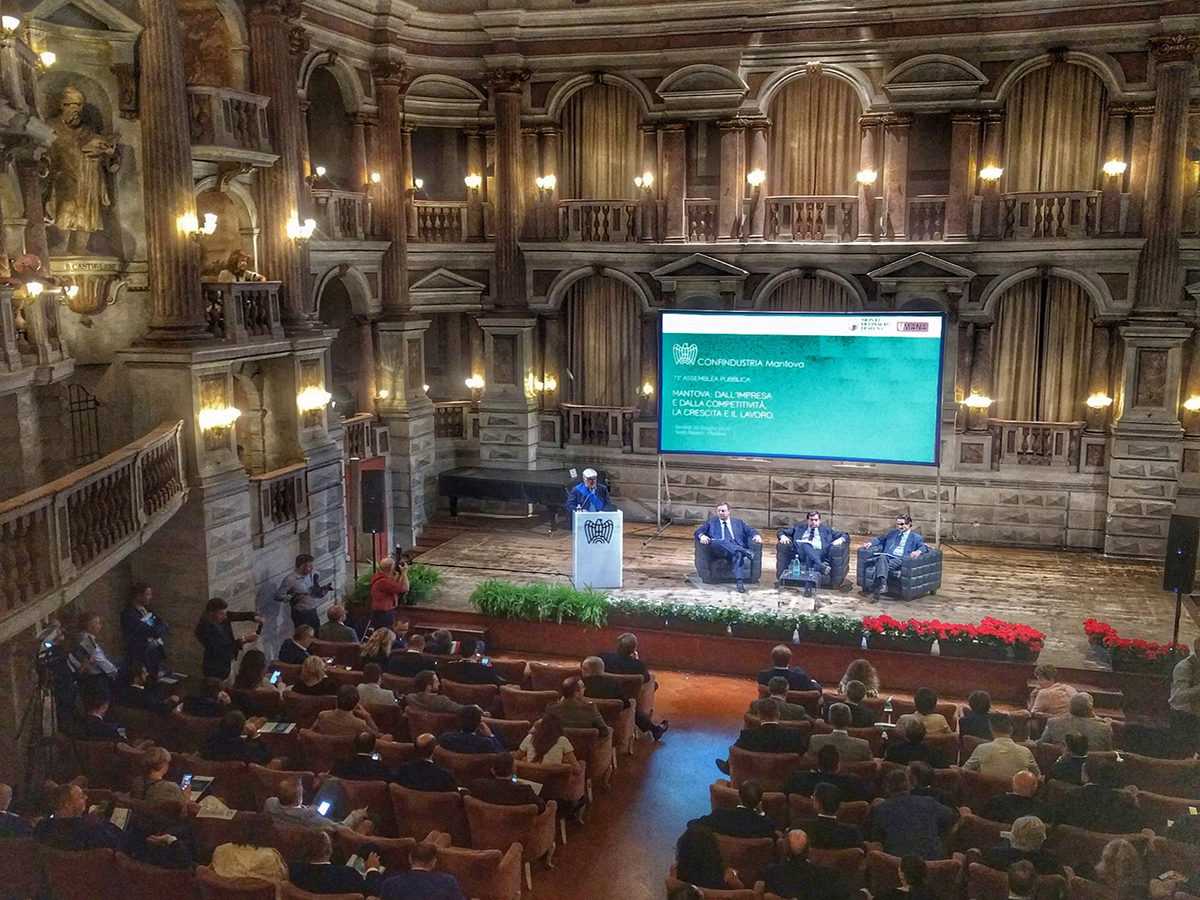
Closing the annual assembly of Confindustria Mantova on 29 June in the presence of high level public authorities and representatives from Confindustria and Italian trade unions, President Emma Marcegaglia stressed that "BusinessEurope’s latest Economic Outlook expects GDP growth of 2.4% in the EU and 2.3% in the Euro area in 2018 and EU unemployment reached its lowest rate since September 2008. However, there are significant risks such as slow progress in Brexit negotiations and a series of unilateral U.S. decisions. Growth is at the risk of peaking and we could be at a turning point in the global trading system". For these reasons, she added, “the European Union needs to show unity and leadership, tackle protectionism and remain committed to open, fair and rules-based trade while adequately protecting the interests of its companies and its citizens. At the same time, Member States need to pursue reforms that improve competitiveness, growth and employment across Europe".
Contact: Daniele Olivieri
Photo copyright: Davide Bonassi
Video message on the EU company law package
How to make the best out of digital solutions and cross-border mobility?
Our comment
U.S. tariffs on EU cars would be a game changer
By Eleonora Catella, Senior Adviser, International Relations
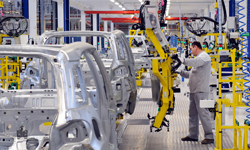 News coming from the U.S. is anything but reassuring. While we have learnt not to believe just any declaration that is tweeted, the tone is getting more worrying by the day. This week started with allegations the U.S. is considering adopting a bill that would make its membership in the World Trade Organisation (WTO) de facto null. The EU was defined “like China, but smaller”.
News coming from the U.S. is anything but reassuring. While we have learnt not to believe just any declaration that is tweeted, the tone is getting more worrying by the day. This week started with allegations the U.S. is considering adopting a bill that would make its membership in the World Trade Organisation (WTO) de facto null. The EU was defined “like China, but smaller”.
According to our information, the U.S. Department of Commerce has been instructed to speed up the newly-launched investigation on cars, based yet again on questionable national security grounds. This likely means that publications of the investigation findings and subsequent presidential decision will be made before the mid-term election of November, possibly already in September or October. Should additional duties be imposed on imports of cars and car parts from the EU, it may be a game changer. If duties are imposed at the end of the road, a volume of trade about six times larger than in the case of aluminium and steel will be involved. It may mean something radically different than the introduction of additional duties on steel and aluminium.
Back then, we could still wonder whether the impact on the EU was the fruit of a grave miscalculation on the part of the U.S. Administration of how to address the actual cause of problems. This time, the intention to hit the EU is clear. The question remains: how should the EU respond to this? Shall we consider it as the passing of a threshold and the end of the transatlantic relationship as we know it? Would there be any room left for a positive agenda with this U.S. Administration?
One option for the EU would be to make use of a mix of carrot and stick. The carrot could be the continuation of trilateral talks on China and possibly reforming the World Trade Organisation, together with Japan, with a view to ensure cooperation on curving overcapacity, addressing loopholes in rules regarding subsidies and State-Owned Enterprises, intellectual property rights and forced technology transfers. This is the demonstration that the EU shares the grievances of the U.S. and is serious about addressing the root causes of problems. However, devising the stick is much trickier considering the broad impact.
A first practical problem would be how to address the likely diversion of trade in car and car parts once access to the U.S. market becomes prohibitive. Safeguards measures are not something the EU adopts lightly and might not be suitable in this case. Rebalancing measures on U.S. imported goods would add up to those already in place and it would be difficult to find products that are non-sensitive for the EU. However, rebalancing by using other types of measures for instance limitations on U.S. services would mean touching upon yet another area of trade that cannot be justified under the WTO Safeguards agreement. However painful an analysis, the EU will have to assess its options carefully and take a decision that will not be easy.
Contact: Eleonora Catella
Growth, employment and productivity is the key for social well-being
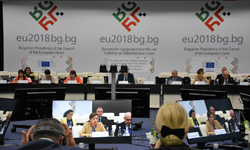 To have more social progress in Europe and make sure our social systems remain robust for future generations, we need to do better on growth, employment and productivity. This was the key message of BusinessEurope Deputy Director General Thérèse de Liedekerke at the 27 June Bulgarian Presidency conference in Sofia on delivering on the European Pillar of Social Rights. She reiterated that implementation of the pillar should be in accordance with subsidiarity and proportionality principles, taking account of diverse national systems and respecting the role of social partners. The European Semester is the main delivery tool. She concluded, “economic and social progress go hand in hand. To improve citizens’ lives in Europe, we must ensure sustained growth and have competitive economic and social systems”.
To have more social progress in Europe and make sure our social systems remain robust for future generations, we need to do better on growth, employment and productivity. This was the key message of BusinessEurope Deputy Director General Thérèse de Liedekerke at the 27 June Bulgarian Presidency conference in Sofia on delivering on the European Pillar of Social Rights. She reiterated that implementation of the pillar should be in accordance with subsidiarity and proportionality principles, taking account of diverse national systems and respecting the role of social partners. The European Semester is the main delivery tool. She concluded, “economic and social progress go hand in hand. To improve citizens’ lives in Europe, we must ensure sustained growth and have competitive economic and social systems”.
Contact: Rebekah Smith
EU and U.S. Legislators supporting the Transatlantic dialogue
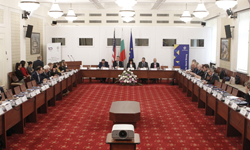 During the Transatlantic Legislators Dialogue meeting that took place in Sofia the 30 June, Luisa Santos, BusinessEurope Director of International Relations, highlighted the importance of keeping the dialogue open between the EU and the U.S. during these challenging times. “The transatlantic economy is too important to risk. We need to find a way to work together by addressing common challenges and deescalating current tensions. The dialogue between legislators on both sides is a good platform to have frank discussions about existing problems and how best to address them”, she stated. During the meeting co-chaired by the Member of the European Parliament (MEP) Christian Ehler on the EU side and House Representative Mario Diaz-Balart on the U.S. side, Santos highlighted that “there is deep concern within the business community in Europe on the consequences of the recent unilateral measures of the U.S. Administration on steel and aluminium, on Iran and Russian sanctions and regarding intellectual property in China. If the US Administration decides to impose additional duties on cars and car parts, the damage would be much bigger, potentially triggering a trade war that we all want to avoid. The business community counts on the active engagement of legislators on both sides and particularly on the U.S. Congress to prevent this”. The joint statement issued at the end of the meeting can be found here.
During the Transatlantic Legislators Dialogue meeting that took place in Sofia the 30 June, Luisa Santos, BusinessEurope Director of International Relations, highlighted the importance of keeping the dialogue open between the EU and the U.S. during these challenging times. “The transatlantic economy is too important to risk. We need to find a way to work together by addressing common challenges and deescalating current tensions. The dialogue between legislators on both sides is a good platform to have frank discussions about existing problems and how best to address them”, she stated. During the meeting co-chaired by the Member of the European Parliament (MEP) Christian Ehler on the EU side and House Representative Mario Diaz-Balart on the U.S. side, Santos highlighted that “there is deep concern within the business community in Europe on the consequences of the recent unilateral measures of the U.S. Administration on steel and aluminium, on Iran and Russian sanctions and regarding intellectual property in China. If the US Administration decides to impose additional duties on cars and car parts, the damage would be much bigger, potentially triggering a trade war that we all want to avoid. The business community counts on the active engagement of legislators on both sides and particularly on the U.S. Congress to prevent this”. The joint statement issued at the end of the meeting can be found here.
Contact: Eleonora Catella
Photo copyright: © European Union 2018 - Source: EP
Reshaping EU relations with China and the U.S.
 Following a first seminar on the EU’s long-term trade strategy that took place in December 2017, BusinessEurope organised a second one, this time focusing on how to reshape the EU’s relations with key trading partners, such as China and the United States. This discussion becomes more relevant in the background of profound challenges faced by the multilateral trading system and the need to develop an ambitious and effective EU strategy on trade ahead as we prepare for European elections (May 2019) and the mandate of a new European Commission. Mikko Huotari, head of the programme on China’s foreign relations at Mercator Institute for China Studies (MERICS) in Berlin, and André Sapir, Senior Fellow at Bruegel joined the discussions and contributed to our understanding of the current challenges and formulation of possible strategies to make the global environment more stable and the rules at its core more tailored to today’s reality. Key takeaways from the discussion: BusinessEurope needs to present concrete proposals (a) to reform the World Trade Organisation (WTO); (b) on the EU-China trade and economic relations; (c) on a broader EU trade strategy that is also ambitious at bilateral level.
Following a first seminar on the EU’s long-term trade strategy that took place in December 2017, BusinessEurope organised a second one, this time focusing on how to reshape the EU’s relations with key trading partners, such as China and the United States. This discussion becomes more relevant in the background of profound challenges faced by the multilateral trading system and the need to develop an ambitious and effective EU strategy on trade ahead as we prepare for European elections (May 2019) and the mandate of a new European Commission. Mikko Huotari, head of the programme on China’s foreign relations at Mercator Institute for China Studies (MERICS) in Berlin, and André Sapir, Senior Fellow at Bruegel joined the discussions and contributed to our understanding of the current challenges and formulation of possible strategies to make the global environment more stable and the rules at its core more tailored to today’s reality. Key takeaways from the discussion: BusinessEurope needs to present concrete proposals (a) to reform the World Trade Organisation (WTO); (b) on the EU-China trade and economic relations; (c) on a broader EU trade strategy that is also ambitious at bilateral level.
Contact: Luisa Santos
Pension reforms remain a key priority
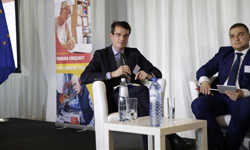 Pension reforms today are essential to ensure social fairness between generations over the long-term. Without reforms, our current systems will be under increasing pressure. In a context of increasing life expectancy at birth, the main solution is to prolong working careers and increase employment participation levels across the board, in particular of women. This is how adequate pensions can be maintained in the future, taking into account the role of occupational and private pensions. This was the main message given by Social Affairs Director Maxime Cerutti, at the conference on the 2018 European Commission Pensions Adequacy Report, held in Brussels on the 2nd of July. He added that, at EU level, the way forward is to strengthen policy coordination between Commission, Member States and social partners through the European semester. When putting in place the necessary reforms, there is value for Member States to consider other countries’ experiences.
Pension reforms today are essential to ensure social fairness between generations over the long-term. Without reforms, our current systems will be under increasing pressure. In a context of increasing life expectancy at birth, the main solution is to prolong working careers and increase employment participation levels across the board, in particular of women. This is how adequate pensions can be maintained in the future, taking into account the role of occupational and private pensions. This was the main message given by Social Affairs Director Maxime Cerutti, at the conference on the 2018 European Commission Pensions Adequacy Report, held in Brussels on the 2nd of July. He added that, at EU level, the way forward is to strengthen policy coordination between Commission, Member States and social partners through the European semester. When putting in place the necessary reforms, there is value for Member States to consider other countries’ experiences.
Contact: Guillaume Cravero
Photo copyright: European Commission
Addressing gender segregation in education and occupations
 Gender segregation in education, training, labour market and occupation is the consequence of many factors such as individual preferences, career orientation and stereotypes. Whilst men are not incentivised to pursue careers in healthcare, education or public sectors, women continue to overlook opportunities in the science, technology, engineering or mathematics professions. This has a negative impact on the gender pay gap. These were the key messages of Deputy Social Affairs Director Rebekah Smith at the learning seminar of the European social partners organised in cooperation with the European Institute for Gender Equality (EIGE) on 3 July in Brussels. She added, “more needs to be done with all stakeholders to rebalance the situation, including raising awareness towards boys and girls at an early stage in schools, addressing skills mismatches and reforming education systems”.
Gender segregation in education, training, labour market and occupation is the consequence of many factors such as individual preferences, career orientation and stereotypes. Whilst men are not incentivised to pursue careers in healthcare, education or public sectors, women continue to overlook opportunities in the science, technology, engineering or mathematics professions. This has a negative impact on the gender pay gap. These were the key messages of Deputy Social Affairs Director Rebekah Smith at the learning seminar of the European social partners organised in cooperation with the European Institute for Gender Equality (EIGE) on 3 July in Brussels. She added, “more needs to be done with all stakeholders to rebalance the situation, including raising awareness towards boys and girls at an early stage in schools, addressing skills mismatches and reforming education systems”.
Contact: Guillaume Cravero
Talking tax in Munich
 BusinessEurope’s Tax Policy Group Chair Krister Andersson participated in a conference in Munich on “Digitalisation and the Future of Profit Taxation” on 29 June, which was jointly hosted by the Business and Industry Advisory Committee (BIAC) to the Organisation for Economic Co-operation and Development (OECD), the International Chamber of Commerce (ICC) and BusinessEurope. Andersson spoke with Maria Teresa Fabregas, Director of Tax Administration at the European Commission’s Directorate-General for Taxation and Customs Union (DG TAXUD), on the digitalisation of tax administrations. Throughout the conference, the panellists talked about innovations such as online tax accounts, blockchain, automation (including artificial intelligence) and greater access to data, which can transform the tax landscape to a large extent. Andersson stated that these upcoming technologies cannot only help in the fight against tax and VAT-fraud but can also simplify the work of tax administrations and businesses significantly, ensuring a smoother functioning of day-to-day operations.
BusinessEurope’s Tax Policy Group Chair Krister Andersson participated in a conference in Munich on “Digitalisation and the Future of Profit Taxation” on 29 June, which was jointly hosted by the Business and Industry Advisory Committee (BIAC) to the Organisation for Economic Co-operation and Development (OECD), the International Chamber of Commerce (ICC) and BusinessEurope. Andersson spoke with Maria Teresa Fabregas, Director of Tax Administration at the European Commission’s Directorate-General for Taxation and Customs Union (DG TAXUD), on the digitalisation of tax administrations. Throughout the conference, the panellists talked about innovations such as online tax accounts, blockchain, automation (including artificial intelligence) and greater access to data, which can transform the tax landscape to a large extent. Andersson stated that these upcoming technologies cannot only help in the fight against tax and VAT-fraud but can also simplify the work of tax administrations and businesses significantly, ensuring a smoother functioning of day-to-day operations.
Contact: Pieter Baert
EU emissions trading: resolve issues on implementation phase
 After a thorough revision of the EU Emissions Trading System (EU ETS), industry sectors under the EU ETS and Member States are now required to provide data to the European Commission. This data is then used to redetermine the amount of free allowances that each sector under the EU ETS is entitled to. BusinessEurope has sent a letter to the European Commission Directorate-General for Internal Market, Industry, Entrepreneurship and SMEs (DG GROW) and the Directorate General for Climate Action (DG CLIMA) addressing some industry-wide concerns on this exercise, specifically regarding consistency, administrative burden, data and accuracy requirements. BusinessEurope’s Industrial Affairs Director Alexandre Affre states in the letter that “it is important to allow for sufficient timing for a thorough discussion with relevant experts of industry and the Member States since they will be charged with the execution of the data exercise”. For more details, please find the letter here.
After a thorough revision of the EU Emissions Trading System (EU ETS), industry sectors under the EU ETS and Member States are now required to provide data to the European Commission. This data is then used to redetermine the amount of free allowances that each sector under the EU ETS is entitled to. BusinessEurope has sent a letter to the European Commission Directorate-General for Internal Market, Industry, Entrepreneurship and SMEs (DG GROW) and the Directorate General for Climate Action (DG CLIMA) addressing some industry-wide concerns on this exercise, specifically regarding consistency, administrative burden, data and accuracy requirements. BusinessEurope’s Industrial Affairs Director Alexandre Affre states in the letter that “it is important to allow for sufficient timing for a thorough discussion with relevant experts of industry and the Member States since they will be charged with the execution of the data exercise”. For more details, please find the letter here.
![]() Contact: Leon de Graaf
Contact: Leon de Graaf
Calendar
- 9 July: EU-Japan Economic Partnership Agreement
- 15 July: Informal Competitiveness Council (COMPET)
- 16-17 July: EU-China Business Summit, Beijing, China
Reminder: please take a look at our revised privacy policy